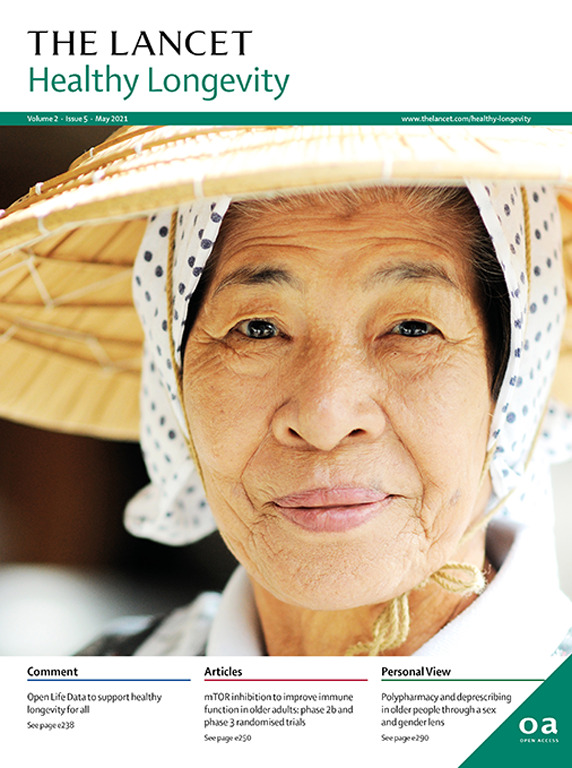在紧急医疗环境中与老年人就急性恶化的治疗升级计划共同决策:一项基于英国的患者观点定性研究(STREAMS-P)。
IF 14.6
Q1 GERIATRICS & GERONTOLOGY
引用次数: 0
摘要
背景:治疗升级计划(TEP)中的共同决策(SDM)涉及患者和临床医生共同确定未来健康恶化的应急情况。患者在保健决策中的作用一直是争论的主题。本研究旨在了解英国老年患者对急性医院环境下TEP SDM的看法。方法:在这一定性研究中,我们通过初级保健在内伦敦行政区招募了不同程度的虚弱和不同种族的老年人。我们排除了没有能力做出TEP决定、不能用英语访谈、主要慢性临床问题是癌症或已确定的严重单器官衰竭的个体。我们使用有目的的分层抽样来捕获各种年龄,体质和种族。我们于2023年3月31日至12月19日进行了半结构化访谈,并进行了录音。然后我们进行了反身性主题分析。研究结果:我们对32名参与者进行了27次访谈。参与者年龄在63-101岁之间,临床虚弱从无到严重不等,分布在不同年龄组,19名参与者为女性,13名参与者为男性。我们从访谈中确定了四个主题:(1)关注自然生活,这反映了参与者对预期生命和死亡轨迹的看法;(2)理解不熟悉的医学叙事,不期望对医疗干预进行详细规划;(3)我的身体,我的决定,其中强调保持对保健决定的控制;和(4)专家,不完善的医生在一个基本的,不完善的系统,其中的决策涉及医疗保健专业人员在一个紧张的英国卫生服务的背景下进行了考虑。解释:患者没有立即意识到对未来治疗的详细计划的相关性,但尽管如此,他们仍表现出决心成为医疗保健决定的最终仲裁者。在日益强调患者自主权的背景下,未来的步骤包括对强化医疗干预的可能性和局限性进行公众教育,临床医生对TEP对话方法的反思,以及政策层面的审议,以确定患者参与TEP决策的期望。资助:HCA国际和NIHR帝国生物医学研究中心。本文章由计算机程序翻译,如有差异,请以英文原文为准。
Shared decision making with older people on treatment escalation planning for acute deterioration in the emergency medical setting: a UK-based qualitative study of patient perspectives (STREAMS-P)
Background
Shared decision making (SDM) in treatment escalation planning (TEP) involves patients and clinicians determining together a contingency for future health deterioration. Patients’ role in health-care decision making is subject to ongoing debate. This study aimed to understand the perspectives of older patients in the UK on SDM in TEP for the acute hospital setting.
Methods
In this qualitative study, we recruited older adults with varying levels of frailty and diverse ethnicity via primary care in an Inner London borough. We excluded individuals who did not have the capacity to make TEP decisions, could not be interviewed in English, or whose main chronic clinical problem was cancer or an established severe single organ failure. We used purposive stratified sampling to capture a variety of age, frailty, and ethnicity. We conducted semistructured interviews from March 31 to Dec 19, 2023, and audiorecorded them. We then performed a reflexive thematic analysis.
Findings
We conducted 27 interviews with 32 participants. Participants were aged 63–101 years, clinical frailty ranged from none to severe and was distributed across age groups, and 19 participants were female and 13 participants were male. We identified four themes from the interviews: (1) Focusing on a Natural Life Lived Well, which reflects participants’ ideas around expected life and death trajectory; (2) Making Sense of an Unfamiliar Medical Narrative, where detailed planning for medical intervention was not expected; (3) My Body, My Decision, in which there was emphasis on retaining control over health-care decisions; and (4) Expert, Imperfect Doctors in an Essential, Imperfect System, in which the context of decision making involving health-care professionals in a stretched UK health service was considered.
Interpretation
Patients did not immediately perceive the relevance of detailed planning for future treatment, but nonetheless showed determination to be final arbiters on health-care decisions. Viewed in the context of increasing emphasis on patient autonomy, future steps include public education on possibilities and limitations for intensive medical intervention, clinician reflection on approaches to TEP conversations and policy-level deliberation to define expectations for patient involvement in TEP decisions.
Funding
HCA International and NIHR Imperial Biomedical Research Centre.
求助全文
通过发布文献求助,成功后即可免费获取论文全文。
去求助
来源期刊

Lancet Healthy Longevity
GERIATRICS & GERONTOLOGY-
CiteScore
16.30
自引率
2.30%
发文量
192
审稿时长
12 weeks
期刊介绍:
The Lancet Healthy Longevity, a gold open-access journal, focuses on clinically-relevant longevity and healthy aging research. It covers early-stage clinical research on aging mechanisms, epidemiological studies, and societal research on changing populations. The journal includes clinical trials across disciplines, particularly in gerontology and age-specific clinical guidelines. In line with the Lancet family tradition, it advocates for the rights of all to healthy lives, emphasizing original research likely to impact clinical practice or thinking. Clinical and policy reviews also contribute to shaping the discourse in this rapidly growing discipline.
 求助内容:
求助内容: 应助结果提醒方式:
应助结果提醒方式:


